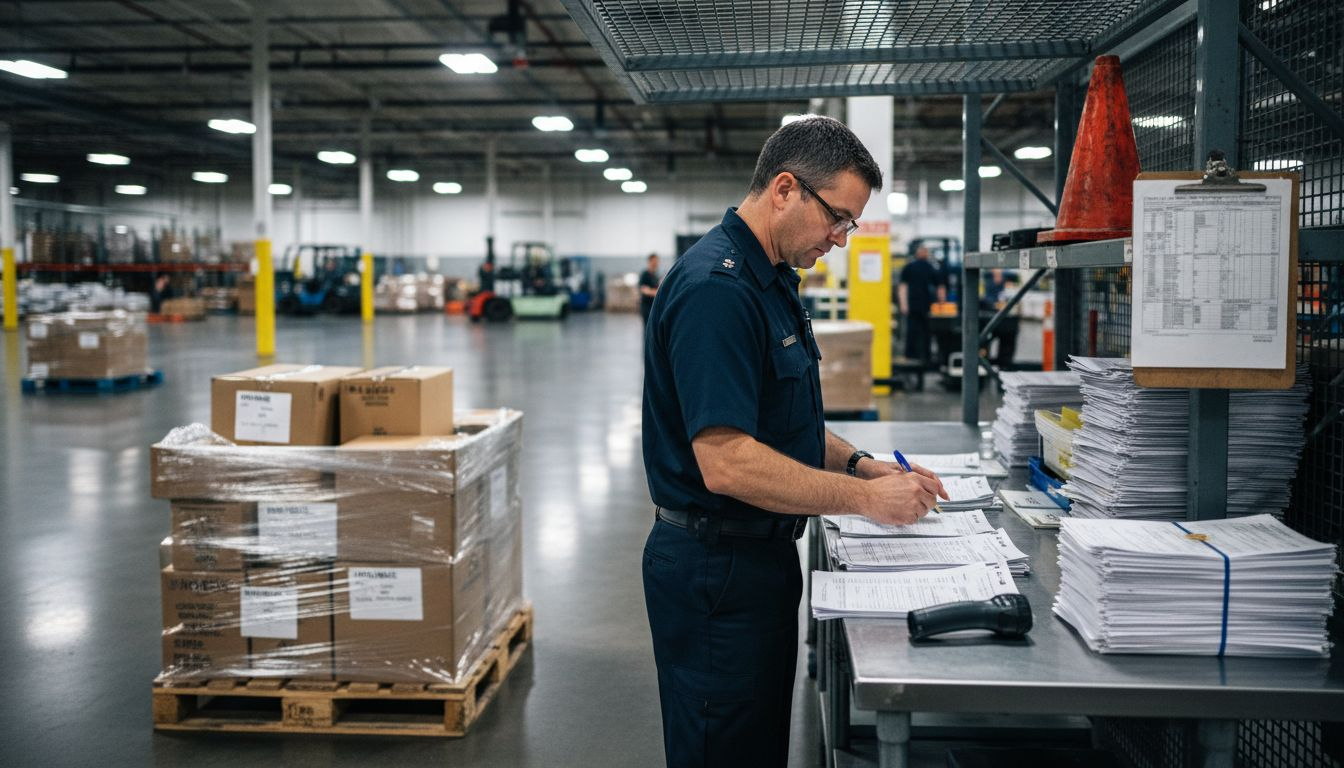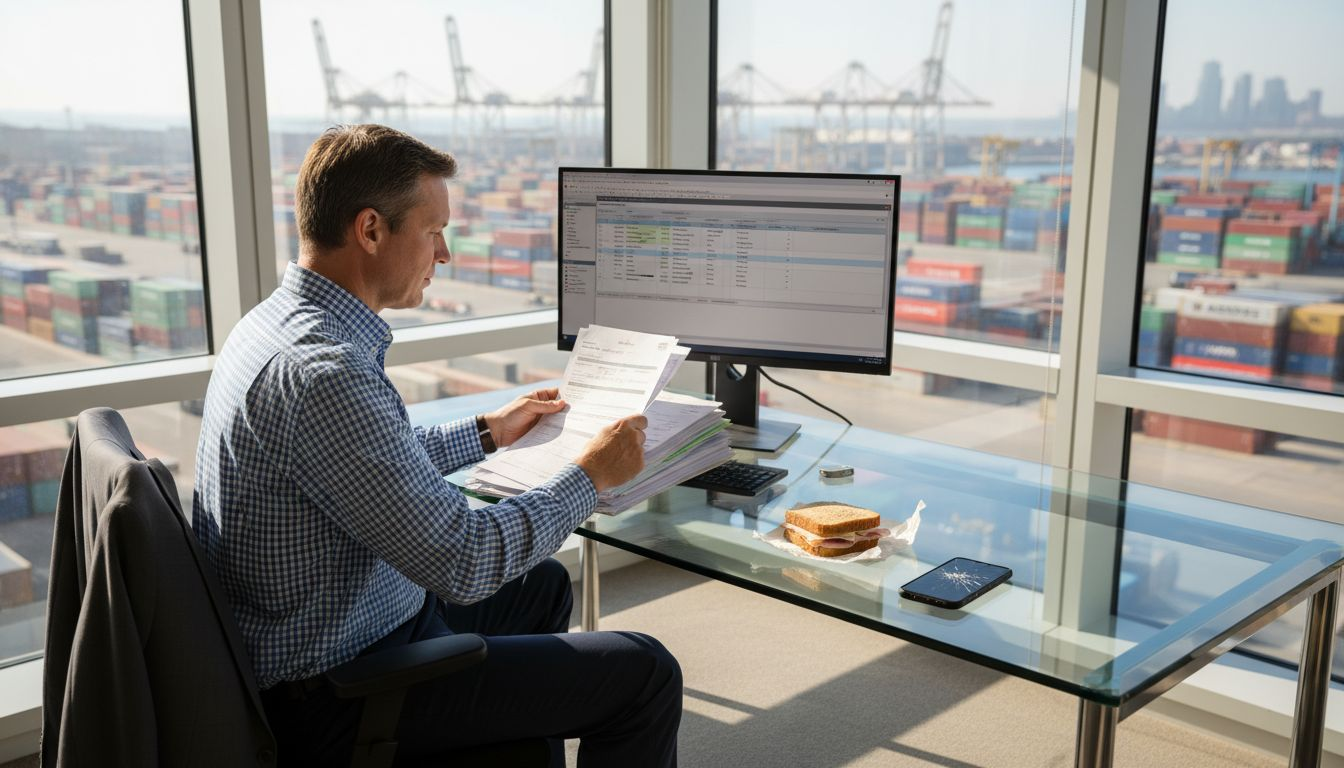Sending goods across international borders sounds simple enough, but the paperwork can quickly snowball into a mountain of stress. Imagine this. Shipments worth over $2,500 usually need formal clearance by a licensed customs broker. Many businesses think customs clearance is just a checklist, yet it is actually a make-or-break gateway that can protect your bottom line and keep shipments moving when the rules change overnight.
Table of Contents
- What Is A Customs Clearance Company?
- The Importance Of Customs Clearance In Trade
- How Customs Clearance Companies Operate
- Key Concepts In Customs Compliance And Regulations
Quick Summary
| Takeaway | Explanation |
|---|---|
| Customs brokers facilitate international trade | These companies manage documentation and compliance, enabling smooth movement of goods across borders. |
| Regulatory compliance is crucial | Understanding complex customs regulations protects against delays and financial penalties for businesses. |
| Strategic coordination is essential | Effective communication between importers, exporters, and customs agencies ensures efficient shipping. |
| Accurate documentation is vital | Precise tariff classification and documentation are necessary to meet legal requirements and avoid penalties. |
| Continuous training is needed | Ongoing education in customs compliance helps businesses stay updated on international trade regulations. |
What is a Customs Clearance Company?
A customs clearance company is a specialized organization that facilitates the complex process of moving goods across international borders by managing legal, regulatory, and administrative requirements for importers and exporters. These professional service providers act as critical intermediaries between businesses and government customs agencies, ensuring smooth and compliant international trade transactions.
Core Functions of Customs Clearance Companies
Customs clearance companies perform several essential functions that streamline international shipping processes. These functions include:
- Preparing and submitting required documentation for imports and exports
- Calculating and managing customs duties and taxes
- Classifying goods according to international trade regulations
- Providing guidance on import and export compliance
- Coordinating with government customs authorities
According to Cornell Law School’s regulatory definitions, customs brokers are licensed professionals authorized to manage transactions with customs agencies, handling everything from merchandise entry to duty payment.
Importance in International Trade
Customs clearance companies are crucial in international trade because they help businesses navigate complex regulatory landscapes. Without their expertise, companies risk significant delays, financial penalties, and potential legal complications. By understanding intricate customs regulations, tariff classifications, and documentation requirements, these companies ensure that shipments move efficiently across borders.
Businesses rely on customs clearance companies to reduce administrative burdens, minimize compliance risks, and optimize their international shipping strategies.
The following table summarizes the core functions performed by customs clearance companies and explains the purpose of each function for international trade.
| Function | Explanation |
|---|---|
| Documentation Preparation | Prepares and submits all required paperwork for imports and exports. |
| Duty and Tax Calculation | Calculates and manages customs duties and taxes owed for shipments. |
| Goods Classification | Classifies goods accurately using international trade codes and regulations. |
| Compliance Guidance | Provides expert guidance to ensure importers and exporters meet trade regulations. |
| Coordination with Authorities | Communicates and coordinates directly with government customs departments and agencies. |
| Risk Management | Identifies and addresses potential regulatory or financial risks for shipments. |
| Trade Optimization | Advises on strategies to streamline shipping and reduce administrative burdens. |
As UC Berkeley’s trade compliance resource indicates, shipments valued over $2,500 typically require formal clearance by a licensed customs broker who possesses the legal authority to manage customs processes on behalf of importers.
The Importance of Customs Clearance in Trade
Customs clearance plays a pivotal role in international trade, serving as a critical gateway that ensures the smooth, legal, and efficient movement of goods across national borders. This complex process goes far beyond simple paperwork, representing a sophisticated system that protects national economies, maintains regulatory compliance, and facilitates global commerce.
Economic and Regulatory Protection
Customs clearance serves multiple essential economic and regulatory functions that are fundamental to international trade. These include:
- Protecting domestic industries from unfair competition
- Collecting import duties and taxes that contribute to national revenue
- Preventing the entry of prohibited or dangerous goods
- Ensuring compliance with international trade agreements
- Tracking and managing cross-border economic transactions
According to the United States International Trade Commission, implementing modern customs reforms like online single window systems and advanced risk assessment tools significantly enhances trade efficiency and reduces administrative barriers.
Risk Management and National Security
Customs clearance is a critical mechanism for national security and risk management. By meticulously examining incoming shipments, customs authorities can intercept potentially harmful goods, prevent illegal trade, and protect citizens from potential threats. This process involves comprehensive screening of documentation, physical inspection of goods, and sophisticated risk assessment protocols.
Businesses engaging in international trade depend on robust customs clearance processes to mitigate risks associated with regulatory non-compliance, potential financial penalties, and shipment delays. Professional customs clearance services provide the expertise needed to navigate complex international trade regulations, ensuring that goods move seamlessly across borders while adhering to all legal requirements.
How Customs Clearance Companies Operate
Customs clearance companies function as sophisticated intermediaries that manage the intricate process of moving goods across international borders. Their operational framework involves a complex network of regulatory compliance, documentation management, and strategic coordination with multiple stakeholders.
Documentation and Compliance Management
The core of a customs clearance company’s operations revolves around meticulous documentation and regulatory compliance. This process encompasses several critical activities:
- Gathering and verifying all required shipping and import/export documents
- Accurately classifying goods according to international harmonized tariff codes
- Calculating precise customs duties and taxes
- Preparing and submitting comprehensive customs declarations
- Ensuring all documentation meets specific regulatory requirements
Professional customs clearance companies leverage advanced technological systems and deep regulatory knowledge to streamline these complex administrative processes. They interpret intricate trade regulations and ensure that every shipment meets the specific requirements of different national customs authorities.
Strategic Coordination and Communication
Successful customs clearance relies on extensive communication and coordination between multiple parties. Companies must interact effectively with:
- Importers and exporters
- Government customs agencies
- Shipping and logistics providers
- Transportation companies
- Banking and financial institutions
According to U.S. Customs and Border Protection, the operational complexity requires robust administrative management and precise oversight of trade-related transactions.
Customs clearance companies act as critical translators of regulatory language, converting complex legal requirements into actionable logistics strategies. Their expertise allows businesses to navigate the challenging landscape of international trade with confidence, minimizing risks and potential financial penalties associated with non-compliance.

Key Concepts in Customs Compliance and Regulations
Customs compliance and regulations represent a complex framework of legal requirements that govern the international movement of goods. These intricate rules are designed to ensure national security, protect domestic industries, and maintain fair trade practices across global markets.
Fundamental Regulatory Elements
Customs compliance encompasses several critical regulatory elements that businesses must understand and navigate precisely. These foundational concepts include:
- Tariff classification and coding of imported goods
- Accurate determination of merchandise value
- Identifying the country of origin for each product
- Understanding applicable duty rates and tax obligations
- Maintaining comprehensive import and export documentation
Each of these elements plays a crucial role in ensuring that international shipments meet legal standards and avoid potential penalties or delays.
This table outlines the fundamental regulatory elements in customs compliance and describes why each is important to successful international trade operations.
| Regulatory Element | Importance in Customs Compliance |
|---|---|
| Tariff Classification | Ensures correct duty rates are applied by accurately categorizing goods. |
| Merchandise Valuation | Determines the value of goods for appropriate assessment of duties/taxes. |
| Country of Origin | Identifies product origin for compliance with trade agreements/laws. |
| Duty Rates and Taxation | Calculates financial obligations for imported or exported goods. |
| Import/Export Documentation | Maintains legally required records to avoid shipment delays and penalties. |
| Licensing Requirements | Ensures all goods meet legal entry or exit conditions per regulations. |
| Internal Compliance Checks | Reduces the risk of non-compliance through thorough internal processes. |
![]()
Compliance Documentation and Legal Requirements
Companies engaged in international trade must develop robust systems for managing complex regulatory documentation. This involves:
- Obtaining necessary import/export licenses
- Preparing precise commercial invoices
- Generating accurate customs declarations
- Tracking and recording all transactional details
- Implementing internal compliance verification processes
According to U.S. Customs and Border Protection, customs brokers play a pivotal role in helping businesses understand and implement these complex regulatory requirements. They serve as essential intermediaries who translate complex legal language into actionable logistics strategies.
Successful customs compliance requires a proactive approach that anticipates potential regulatory challenges and develops comprehensive strategies to address them. Companies must invest in continuous training, technological solutions, and expert guidance to effectively manage the evolving landscape of international trade regulations.
Experience Seamless Customs Clearance with Worldwide Express
Struggling with the complexities of customs compliance, paperwork, or unpredictable shipment delays? This article explained just how overwhelming regulatory barriers and documentation requirements can be for businesses moving goods across borders. Finding a reliable partner who truly understands customs clearance is not just valuable—it is essential to keep your supply chain moving and avoid costly setbacks.

Let Worldwide Express simplify your global trade experience. With decades of industry expertise and comprehensive services like customs brokerage, international freight forwarding, cargo insurance, and global tracking, we take care of every detail on your behalf. Ready to leave customs headaches behind? Discover how our tailored solutions help you succeed by visiting Worldwide Express now. Make your next international shipment worry-free—connect with our team today and stay ahead in global trade.
Frequently Asked Questions
What is the role of a customs clearance company?
A customs clearance company facilitates the movement of goods across international borders by managing legal, regulatory, and administrative requirements for importers and exporters. They ensure compliance with customs regulations and streamline the shipping process.
Why are customs clearance services important for international trade?
Customs clearance services help businesses navigate complex regulatory landscapes, reducing the risk of delays, financial penalties, and legal complications in international shipping. They ensure that shipments are compliant with all customs regulations.
What are the key functions performed by customs clearance companies?
Customs clearance companies perform several functions, including preparing and submitting required documentation, calculating customs duties and taxes, classifying goods, providing compliance guidance, and coordinating with customs authorities.
How do customs clearance companies manage documentation and compliance?
These companies gather and verify required shipping documents, accurately classify goods, calculate customs duties, prepare customs declarations, and ensure that all documentation meets regulatory requirements, using their expertise to navigate complex trade regulations.






